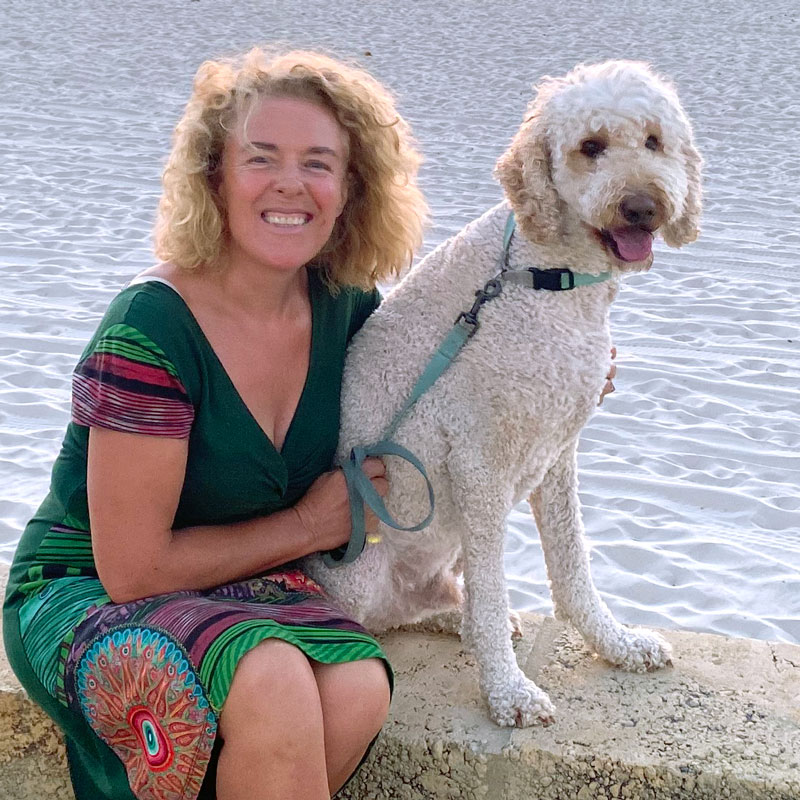When I began writing this yesterday, I had just returned from my local supermarket with six loo rolls and a whole load of anxiety. I could sense the foreboding as I drove into the car-park and drove out again due to the lack of parking spaces. I parked in a nearby street and headed into the mayhem on foot. I was greeted by a trolley jam, each being driven by a very determined and single-minded person whose sole aim was to grab toilet paper and non-perishables as though their life depended on it.
I managed to get what I needed for dinner tonight, despite the dwindling supplies and empty shelves. I haven’t been stockpiling in the belief that we will be able to leave our homes to buy essentials when we need them. I am optimistic enough to assume that manufacturing and deliveries will not cease because this pandemic is not going to affect everyone. Life will surely have to continue for the majority?
That isn’t to say that I don’t agree with social distancing, of course I do. But we need to be rational about how this is going to pan out.
Unpacking the risks
I realise that this is an unprecedented event and the situation will vary, country to country. We’re lucky in Australia where we have a relatively small population (currently around 25 million) which means that we can enjoy 320,000 square metres of landmass per person if we so wish. I have always marvelled at the number of parks and open spaces available to us here in this lucky country. A 75-year-old friend of mine is heading off into the bush with his wife tomorrow in order to escape the risk of contracting the virus as he has an underlying lung condition that could not cope with the illness. They have packed their campervan with supplies for three months and are hoping for the best.
In the meantime, people in Hong Kong only have 140 square metres of space per person. No wonder they shut the whole place down well before the World Health Organisation declared the spread of the Corona Virus a pandemic. The same applies to Italy with less than 5,000 square metres of landmass per capita. They are renowned for their social warmth and their tactile nature. The bottom line is the more people you have in confined spaces, the quicker the virus will spread and the more pressure this will put on our health systems. I can therefore understand their need to act quickly.
What grandparents don’t need
Here in Australia, we still haven’t shut our schools down. Apprehension abounds as to who will take care of the kids if the parents have to work, especially those employed in healthcare and law & order. But I have to say, I think it is irresponsible of our government that we haven’t at least closed down the high schools – these kids are well able to stay home alone. My children’s school has a population in excess of three thousand kids and over two hundred teachers. Imagine how quickly the virus will spread with all of these people living out of each other’s pockets for eight hours a day, five days per week!
Of course, most of us aren’t overly concerned about our children or indeed ourselves contracting the virus if we are healthy and have no underlying issues. The problem lies with who we bring it home to.
For the first time in the ten years since we’ve lived in the most isolated city on the planet, I can see an advantage of not being able to visit my parents easily. I couldn’t bear the thought of passing the virus onto them. It is a blessing that the virus is not dangerous to our healthy children, but it is a curse for our elders and those whose immunity is compromised.
A time to reflect
With that said, I feel there is a need for us to remain calm and to think rationally about what we can and can’t do.
I know that I can minimise my chances of both contracting and spreading this virus by washing my hands regularly, and especially after being in contact with surfaces outside of my home.
I can minimise my exposure by not attending large gatherings. Here in Australia we have been told that any gatherings over five hundred people are to be cancelled.
If I think I might have contracted it, I will self-isolate.
In addition to the preventative measures, here are some things I will be doing more of in the coming weeks:
- I will not be sweating the small stuff but focusing on keeping myself and my family upbeat and healthy. I feel compelled by this event to take stock of my life and to value every single bit of it. My heart is filled with gratitude for the people that bring so much love to my life and in return, allow me to bring love to theirs.
- I refuse to get caught up in the hysteria of panic-buying and will not adopt a me-me attitude at this time. We are all in this together and we need to look out for one another.
- I will lead by example and encourage my kids to help me reach out to the needy in our community. Tomorrow I will put some cards with my phone number in the mailboxes of our elderly neighbours letting them know that we are here if they need any help. Not all of them are tech-savvy and won’t have access to the internet.
- I will be turning more towards online support groups for friendly contact and interaction. For the past ten months I have enjoyed being part of various Facebook groups that focus on living healthy and sober lives. I have made some lovely friends this way. Who cares if they live in Canada or Wales! In fact, it’s enriching to have friends all over the world as we broaden our understanding of life on the planet. While we don’t have the advantage of meeting and talking in person, we have the technological advantage of being able to respond quickly and in greater depth using words and images. There are support groups for everyone – it’s just a matter of researching the groups that reflect your area of interest.
- I can exercise at home if I have to. There are hundreds of YouTube channels dedicated to yoga, Pilates, Tai Chi and other exercises that are normally done in a class. It’s at times like this that we should be increasing our focus on fitness in order to stay in optimum health.
- In addition to exercising, I recommend regular stretching if you are going to be spending a lot of time at home, sitting at your computer, reading, watching TV or doing craft. Again, YouTube has an abundance of videos showing you how to stretch safely.
- I think this is the perfect opportunity to address diet. Since going plant-based, there has been a notable improvement in my health and that of my entire family.
Last year, I couldn’t bend my fingers beyond a certain point because of swelling in my joints caused by arthritis. Now, ten months after quitting alcohol and meat, and three months into my plant-based diet (no dairy, eggs, cheese etc), I am feeling so much lighter, my skin is radiant, and my hair is soft to the touch. We have all shed fat from all the right places. I have been reading a book by Dr Michael Greger called ‘How Not To Die’ that is packed full of wisdom and has inspired me to pursue this new approach to eating. Here, if I may, I quote from that book:
In 1990 around the world, most years of healthy life were lost to undernutrition, such as diarrheal diseases in malnourished children, but now the greatest disease burden is attributed to high blood pressure, a disease of overnutrition. The pandemic of chronic disease has been ascribed in part to the near-universal shift toward a diet dominated by animal-sourced and processed foods ie: more meat, dairy, eggs, fizzy drinks, sugar and refined grains. China is perhaps the best-studied example. There, a transition away from the country’s traditional plant-based diet was accompanied by a sharp rise in diet-related chronic diseases such as obesity, diabetes, cardiovascular diseases, and cancer.
Food for thought, eh?
I don’t mean to distract from the current crisis, however I believe this moment is a wake-up call for us all to think about how we are living now and what needs to change in order that we are in optimum health, mentally and physically, so that we can cope with these types of threats in the future. There has never been a better time.
I will leave you this week with a quote from Michael Leavitt I came across in one of the many posts on Facebook that offers insights into the virus.
Everything we do before a pandemic will seem alarmist. Everything we do after will seem inadequate.
Stay well, stay away from crowds and wash those hands. Let’s all hope for a positive outcome. And before I go, I’d like to wish all my Irish compatriots a St Patrick’s Day full of positivity.

